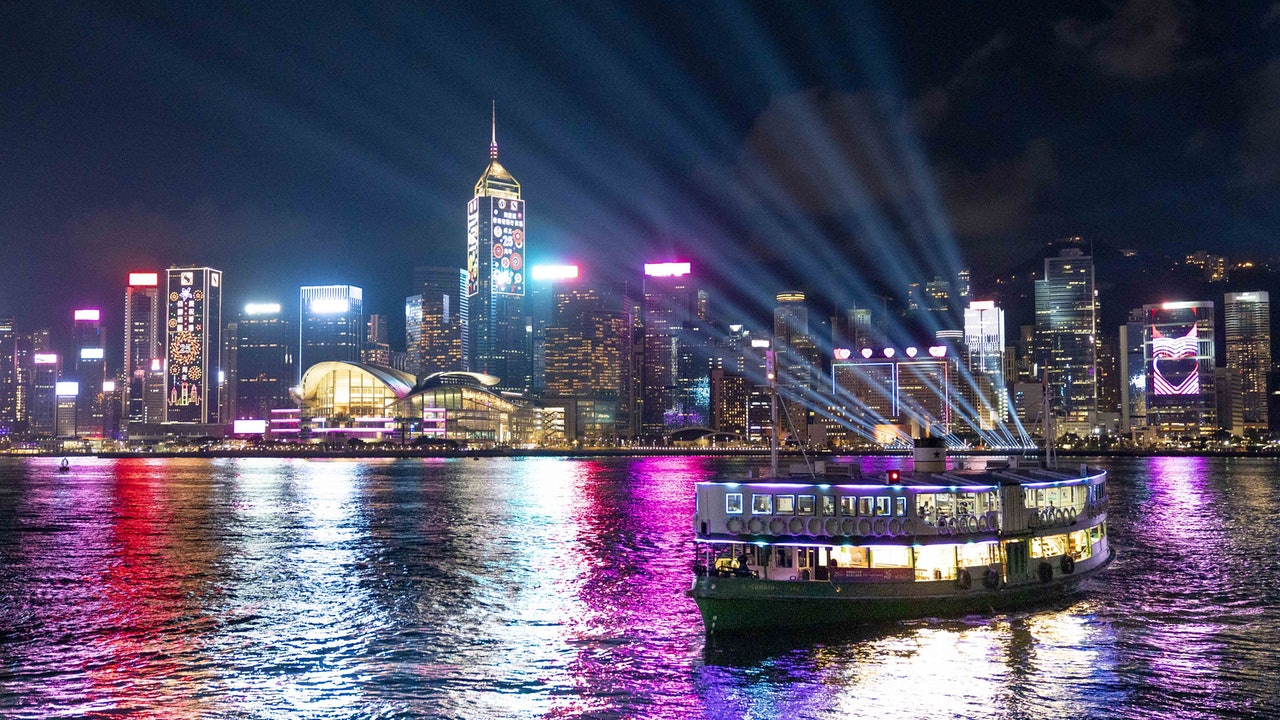Editor's note: This article is the preface written by Yu Pinhai, editor-in-chief of Hong Kong 01, for reporter Wu Ting's new book "Interviews with Seeing Hong Kong".
The development of people and things has a law, it will not be created out of nothing, and it will not be deviant.
People must come from somewhere, and things must have their origins. This is the law.
No matter the age of intellectuals, as long as they are serious readers, they are trying to master this law. Many people believe that this is "Tao", and Chinese civilization has been trying to prove it for thousands of years.
Wu Ting is such a reader. She is one of the many readers among my colleagues, and she is also a serious one.
This time, she tried to take the pulse of Hong Kong's future and find a pattern for what has happened in Hong Kong.
Before reading this book, perhaps everyone should ask why she is so keen to "ask" from the experience of Hong Kong?
Those familiar with the mainland may know that many liberal intellectuals in the mainland once believed that Hong Kong represented the new civilization they aspired to, where there is freedom and people can speak freely.
They even think how wonderful it would be as long as Hong Kong had wider democratic participation, especially universal suffrage, which could be a future example for mainland China.
Such imaginations were prevalent among Chinese intellectuals until Hong Kong's "Occupy Central", Mong Kok riots and anti-amendment riots in 2019.
"Civilized people" who promote democracy and freedom in Hong Kong have turned into thugs, throwing bricks, petrol bombs, burning shops, and even directly burning people. They also advocate "Hong Kong independence". Such uncivilized tactics have completely wiped out the once beautiful imagination.
Are these scholars misreading Hong Kong, or Hong Kong misleading them.
This book provides some of the answers for Wu Ting herself and her fellow travelers.
It’s as if no one or anything can have only one perception. Different people will have different interpretations of other people and things. It doesn’t even matter what is right or wrong, right or wrong. What is right today may become wrong tomorrow.
How can Hong Kong, which is building a new institutional form, be smooth sailing?
"One country, two systems" is an epoch-making great experiment since the concept of a country was born.
However, many people despise this test and don't think it is such a difficult thing. They think that as long as Hong Kong and the mainland have nothing to do with each other, everything will be fine, and they will say the naive argument that "well water does not make river water".
The central government has in fact ignored the complex and uncertain laws of "one country, two systems".
I am convinced that "One Country, Two Systems" will inevitably succeed, but in the process, it will encounter various setbacks and constantly challenge everyone's imagination.
How to manage the process well has become the focus of Hong Kong people, but this is after paying a heavy price.
From Wu Ting's book, you can see how these experts with unique insights have looked at this process from multiple perspectives in the past eight or nine years.
I often ask my colleagues to not only "see" but also "know" in journalism.
There is a close relationship between the two, and they must be interlocked, but seeing is not enough to complete the task, you must know, and even knowing is not enough, you must also know how to spread your knowledge.
We are not politicians, but spreading awareness is a kind of political practice, because when society can have a common understanding of change, many problems can be solved.
Therefore, although journalists are not politicians, they do what politicians should do.
No knowledge, how to spread?
Just seeing it is not enough to complete the work of dissemination, especially for the epoch-making innovation of "one country, two systems".
I asked Wu Ting, what is "seeing"?
She said that "seeing" actually has two considerations: on the one hand, from "Occupy Central" to the amendments, especially the amendments, Hong Kong seems to be really seen by the whole world, and it keeps making headlines, but in fact people only see it It is also a hope that Hong Kong can really be seen.
I have been seen before, but how many people really understand and know Hong Kong well?
There are many people who think that everything will be fine if they return, and what they see should not only be the violence visible to the naked eye on the streets, but also the deeper question: why did they become so violent?
What is broader and deeper thinking?
I am satisfied with Wu Ting's answer.
Seeing Hong Kong is not enough, knowing Hong Kong is the key, especially for those who used to regard Hong Kong as an "ideal country".
(file picture)
Many Hong Kong people "like" to travel to Japan, but not many people have read Japanese history, and even fewer are willing to learn about Japanese society and culture. They are more familiar with where to find the best Japanese ramen.
Of course, not everyone who travels needs to understand the history and culture of the destination, and ramen can also reflect some aspects of Japan.
However, before expressing your "like" to Japan, should you know more about your "object"?
Ramen is not enough to represent Japan after all.
Take a marriage as an example, you can't just see whether the other party is handsome or beautiful, whether he has money or ability, but also needs to know other aspects.
Based on appearance and wealth alone, it is estimated that divorce will soon be possible.
Of course, going on a trip is not as serious as getting married, but when we say we like it, if we don't even know what the other person is, "like" is not real.
That is to say, seeing Hong Kong is not enough, knowing Hong Kong is the key, especially for those who used to regard Hong Kong as an "ideal country".
It seems that Wu Ting has changed from a "tourist" to a scholar who knows Hong Kong.
Chinese scholars have a historical evolution.
Many people regard the May 4th Movement as a turning point in the evolution of modern China, because the Westernization Movement, the Hundred Days Reform, and the 1911 Revolution may have allowed everyone to see the decline of traditional China, but it was not until the May Fourth Movement that everyone realized that seeing was not enough. It is also necessary to understand the reasons behind the decline.
Essentially, finding the right path to change is only possible when we truly recognize the reasons behind the decline.
Li Dazhao and Hu Shi chose completely different paths because they had different understandings of China at that time.
For Chinese scholars today, this dilemma still exists.
Many people are dissatisfied with the speed with which the country is changing, or even the direction it is heading, however, not many can point to a better speed and direction.
There's enough complaining and not being able to give good advice.
Some people saw Hong Kong and thought it was a model, but they didn't know what was going on inside.
Hong Kong has been like Mecca for a long time, a holy city for some people.
When I was in the midst of the "Occupy Central" and anti-amendment riots, I often thought of a group of scholars in the mainland who worshipped the reflection of Hong Kong hanging in the air. They were unwilling, because Hong Kong let them down, but I am also happy to see it Another group of readers found materials for reflection.
I have always believed that only through continuous reflection will people's wisdom become more mature, and people will truly understand the laws of things and will not be confused by visible appearances.
Starting from "seeing", we can continue to ask, is "returning" enough?
Is the idea of "one country, two systems" enough to solve the problem?
Now that it has returned, and the return has been completed with "one country, two systems", why is there an independent trend of thought?
And since when did the two places become so estranged?
Why did it take more than 20 years for everyone to realize that there is such a huge psychological gap between the two places?
Isn't "One Country, Two Systems" just about bridging the gap between the two places?
It is very important to see, and it is even more important to really see. After seeing it, continue to strengthen the understanding until the soul is connected, which is the proper way.
Deng Xiaoping proposed "one country, two systems", not just because he saw it, but because he knew it, and not only knew Hong Kong, but also the mainland and the world.
(file picture)
People and things are in development, people continue to grow, and will not stop for a moment.
When one person stops, another must continue to do what he has not done yet.
Things are always one after another, and there is no one thing that doesn't start another thing before it ends.
That being the case, what does "seeing" mean and what does it mean becomes a more fundamental issue.
We all know that when Deng Xiaoping proposed "one country, two systems", it was not just because he saw it, but because he knew it, and not only knew Hong Kong, but also the mainland and the world.
He first saw the development of the mainland at that time, and realized that it would take a period of time for the mainland to realize modernization and then reach another stage of national development.
He then saw the development of the world, recognized the strengths and weaknesses of various development models, and realized that China's development should not only follow its own path, but also refer to the world's past development experience.
As for solving the Hong Kong issue, he saw the situation in Hong Kong at that time, he also recognized the differences between the mainland and Hong Kong, recognized the role of Hong Kong in the development of the mainland, recognized that Hong Kong can serve as a bridge between the mainland and the world, and recognized the needs of Hong Kong people. Time to integrate with the country.
The central government cannot design the "return" of Hong Kong only based on "seeing", but must design the return of Hong Kong from the perspective of "knowledge".
Only through understanding will everyone believe that "one country, two systems" can really solve the problem, and the optimization of the system will continue to occur.
Wu Ting saw it and began to know it, and she is combining knowledge and communication. This book is part of her social practice.
Hong Kong is changing because more people have seen it and are beginning to realize the truth behind the appearance.
However, there has also been another group of people who are more confused by the appearance of social things. They need more turmoil or more "Wu Ting" to be led back.
As I said before, people continue to grow, and things are one after another. To deal with ignorance, we can only continue to rely on the efforts of readers and the continuous accumulation of knowledge. Besides this, can there be other better methods? ?


/cloudfront-eu-central-1.images.arcpublishing.com/prisa/3I74UEXLYRBBRPGPSGWNN6WXH4.jpg)







/cloudfront-eu-central-1.images.arcpublishing.com/prisa/KMEYMJKESBAZBE4MRBAM4TGHIQ.jpg)


